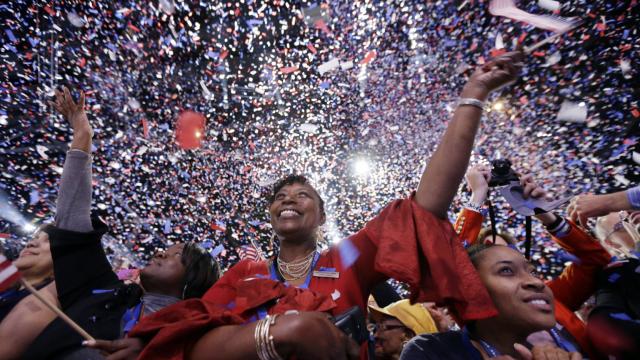
Is the “new populism” hailed by the mainstream press for real? The celebration of Dr. Martin Luther King’s birthday reminds us how far we are from a vibrant people’s movement that can force change in Washington. But the difficulty that the White House has had in enlisting even a handful of Democratic sponsors for its fast-track trade bill suggests that the revolt in the Democratic Party against the policies of its Wall Street wing is continuing to build.
President Obama has begun to champion what might be called a passive-voice populism. He has identified inequality as the “pressing challenge of our time.” He will use his State of the Union address to advocate a hike in the minimum wage, steps towards universal preschool, increased investment in public infrastructure, and comprehensive immigration reform.
He may well urge the Congress once more to pass tax reform that insures billionaires don’t pay lower taxes than their secretaries and that closes down the offshore tax dodges that enable companies like GE to avoid taxes altogether. Hopefully, he’ll embrace Democratic House leader Nancy Pelosi’s women’s economic agenda – including paid family leave and support for childcare, among other items.
But the president continues to describe inequality has something akin to a natural disaster or an act of God. Globalization happened. Technological development happened. The resulting pressures left workers behind, while the few profited immensely.
This passive-voice populism gets it wrong. Inequality didn’t just happen to us. It wasn’t inevitable. Just as the broad middle class was constructed brick by brick after World War II, the decline of that middle class was constructed policy-by-policy, step-by-step over the last three decades. Lifting the floor with a long-overdue hike in the minimum wage and enabling more children to have the opportunity to learn are steps in the right direction. But we won’t do much about new inequality until we challenge the policies and change the rules that created it.
Active-Voice Populism
That’s one reason Massachusetts Sen. Elizabeth Warren has electrified activists across the country. Her populism has an active voice. They rigged the rules. They paid the lobbyists, financed the politicians, and supported the think tanks. Consider the heart of her speech to the 2012 Democratic Convention as she burst onto the stage as a new candidate for the Senate:
"People feel like the system is rigged against them. And here’s the painful part: they’re right. The system is rigged. Look around. Oil companies guzzle down billions in subsidies. Billionaires pay lower tax rates than their secretaries. Wall Street CEOs—the same ones who wrecked our economy and destroyed millions of jobs—still strut around Congress, no shame, demanding favors, and acting like we should thank them.
"Anyone here have a problem with that? Well I do. I talk to small business owners all across Massachusetts. Not one of them—not one—made big bucks from the risky Wall Street bets that brought down our economy. I talk to nurses and programmers, salespeople and firefighters—people who bust their tails every day. Not one of them—not one—stashes their money in the Cayman Islands to avoid paying their fair share of taxes."
With that active voice, the Democratic wing of the Democratic Party has begun to challenge not simply the right, but the Wall Street dominance of our politics. The core elements of that challenge – which is only beginning to build – include the following.
Predistribution, Not Just Redistribution
With the top 1 percent pocketing fully 95 percent of the income growth of the society, and profits at record highs and wages at record lows as a percentage of the economy, populists believe workers should capture a fair share of the profits and productivity they help to produce. So they champion not just increasing the minimum wage, but empowering workers at the workplace to organize and bargain collectively.
They will push for basic guarantees for workers, starting with paid family leave, minimum paid vacation, and guaranteed overtime. And they will lead the growing revolt against perverse CEO compensation schemes that give executives multi-million dollar personal incentives to loot their own companies.
Balanced Trade, Not Corporate Trade Deficits
Our global trade policies have been defined by and for multinational banks and companies. They have shipped good jobs abroad and driven wages down at home, while racking up unprecedented and unsustainable trade deficits. Those imbalances, as the International Monetary Fund and former Federal Reserve Chair Ben Bernanke have noted, contributed directly to blowing up the global economy.
The new populists demand balanced trade policies. They call on the administration to challenge the currency manipulation of China and the mercantilist nations. They want global rules that protect workers and the environment, creating a floor that lifts standards up, not a ceiling that drives them down. And they will challenge the ersatz corporate trade judiciary that empowers closed tribunals of corporate attorneys to overturn America’s protections of workers, consumers or the environment.
The first test here will come as the president pushes for fast-track trade authority that would force Congress to provide an up-down vote, with no amendment and limited debate, for the trans-Pacific trade treaty now being negotiated behind closed doors by representatives of global corporations.
Public Investment, Not Private Stealth
The apostles of the new inequality have unrelenting sought to starve the public sector. President Reagan opened the offensive against domestic investments. Perhaps the hinge moment was in the final years of the Clinton administration when the budget went into surplus, and Clinton, the finest public educator of his time, pushed for paying down the national debt rather than making the case for public investment. He left the field open for George W. Bush to give the projected surpluses away in tax cuts skewed to the top end.
The result is a public squalor that undermines the health of both Americans and the economy. From falling bridges to exploding sewer pipes, slow broadband and an outmoded electric grid, aging schools and shabby public parks, our core infrastructure desperately needs rebuilding. And we aren’t making the investments vital to our future – in the basics of education from preschool to affordable college, in public research and development, in a full-bore commitment to capture the lead in the green industrial revolution that will sweep the world.
Much of this debate has been framed around the faltering recovery, as the Congress perversely punted on the opportunity to rebuild America when we could borrow money for virtually nothing, with construction workers idle and eager to work. But in the end, this is a question of making the public investments we need, and paying for it by ending the tax dodges and tax breaks that enable the rich and the multinationals to avoid paying their fair share of taxes. The Congressional Progressive Caucus budget shows what is possible, while still bringing our long-term debt under control.
Nurturing Manufacture, Curbing Wall Street
Another core challenge will be to revive our ability to make things in America once more. America needs a manufacturing strategy to ensure that we not only remain a center of innovation, but also a center of production.
Part of that is a transformed trade strategy, as noted above. Part is to curb Wall Street, closing down the casino economy that fosters speculation rather than investment. Senators Sherrod Brown and Jeff Merkley have led the charge to break up the big banks, now more concentrated than ever. Sen. Elizabeth Warren has called for reinstating the Glass-Steagall separation between banking and proprietary trading, insuring that the government is not guaranteeing the losses of Wall Street traders. These, only first steps, are not even close to gaining a vote.
Clean Out the Stables
A final monumental challenge will be to curb the reign of interests in Washington. Not surprisingly, big-money politics corrupts the city. Corporations subsidize the politicians who defend their subsidies. Politicians and staffers retire to cash in as lobbyists for the industries that they succored in office. Think tanks churn out studies defending the interests who help pay the rent. The more the 1 percent benefit from rigging the rules, the more they invest in insuring that the rules remain rigged.
A poster child of this corruption is the astounding law that prohibits Medicare from negotiating mass discounts on prescription drugs, ushered into law by a Republican Committee chair who retired to become a million-dollar-a-year Big Pharma lobbyist.
To have any hope of reducing the new inequality and rebuilding the middle class, an aroused public will have to take back Washington, throw the corrupt out of office, curb the revolving door, and clean the place out.
It Takes a Movement
What’s clear is that the new inequality won’t be redressed by passive-voice populism. To rebuild a broad middle class will take much more than the growing Democratic wing of the Democratic Party. Taking on the big money, the entrenched interests, the failed ideas and ideologies will require a fierce, independent and powerful movement.
Occupy Wall Street provided the first volleys. But we will need much more popular education and much greater popular mobilization. Hard times do not generate movements; times have been hard for people for a long time. Movements grow only when harsh reality is combined with dedicated organizers and teachers. In the original populist movement at the end of the 19th century, literally thousands of organizers lectured on the back of wagons in farms across the country, helping people to understand how they were getting shafted, who was at fault, and what they might do about it.
Obama’s new focus on inequality is important. The leadership of senators Elizabeth Warren, Sherrod Brown, Jeff Merkley and Bernie Sanders; the Congressional Progressive Caucus and others is essential. But we won’t rebuild the middle class unless Americans demand it, and make their representatives act on it.
3 WAYS TO SHOW YOUR SUPPORT
- Log in to post comments












